| |
"Vincent and I came to agree that horror comes from the unconscious. In fact, for years we have had this theory, developed little by little over the course of our working together, that horror and fear are two quite distinct things. Horror is in part the reconstruction of childhood fantasies, and in part the anxiety from the world that surrounds us." |
| |
Roger Corman Interview by Patrick Schupp |
The title of this review only makes sense if you are familiar with the narrative elements of the original Edgar Allan Poe story. As I assume and suspect that no one reading this gives a damn about those (that's OK, I live in the 21st century too), then the title will have to stand as a silly pun instead of a meticulously researched one... Trust me, I worked hard for that pun but am happy to fall on my metaphorical sword. Speaking of falling...
There seems to be a slight ambiguity about the actual title of this movie. Taken from the Edgar Allan Poe tale unambiguously named 'The Fall of the House of Usher', the movie seems to have taken on two names: one with 'The Fall of' and the other without. I can only think that marketing folks in the 60s presupposed that potential audiences would not flock to see a movie where it was indeed obvious from the start that the poor, unfortunate Usher House was going to fall. I mean, it could rise, couldn't it? It must have been the same minds that decided to leave the words 'hits iceberg and sinks' out of the original title of Titanic, or those that convinced M. Night Shyamalan to leave out the subtitle 'Bruce Is Dead From The Start' from The Sixth Sense. Canny people, these marketing types. On this subject, more I will not say. But the heart will go on. Sigh.
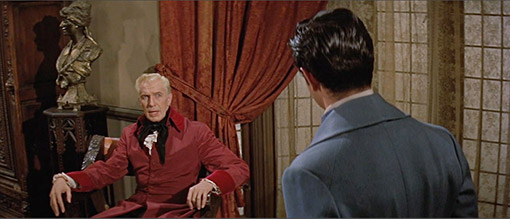
Madness on film is tricky. I don't mean like a fiendish Sudoku 'tricky' but more like a translation of a foreign word for which no corresponding native language word exists 'tricky'. What actually is madness portrayed in a visual medium? There are the tropes, the clichés and the canards (bulging eyes, a rictus grin, over dramatic physical contortions) and yet, I have seen very few convincingly insane characters on screen, most probably because I don't know what 'madness' looks like, the partially covered faces of violent extremist idiots notwithstanding. So how about those actors who've convinced? Kevin Spacey rubbed up against it in Se7en (madness can appear wonderfully and outrageously normal) and Brad Pitt in 12 Monkeys knocked on its door. It's easy to drift off past verisimilitude and into areas best left to those willing to be mocked. In Billy Wilder's The Lost Weekend, alcoholic Ray Milland finds himself in the sanatorium with fellow Delirium Tremens sufferers and one in particular really made me feel his pain and madness with his terrible scream. And then there's the trade marked Poe madness that has self-importance and great reserves of formal, gothic portentousness attached to it almost as if madness was a class demarcation. If The Raven was a delicious farce trading on how easily camp follows theatricality, Usher is something very different, something genuinely creepy and despite the modest claims of its director, it's very effective in its own low-key way.
In an unnamed, inexplicably charred, marshy area (charred and marshy, go figure) rides straitlaced Philip Winthrop (just the way Price pronounces his surname fills me with childish delight, which is just like Turkish Delight but made of... better stop there.) He's engaged to be married to Madeline Usher whom he intends to call on and whisk away with him back to Boston. His arrival at the family home could not be more forbidding if the butler, grey haired stalwart Bristol (Harry Ellerbe), opened the door with a pitchfork with a mission to shish kebab him. Again, we are in Corman-Poe movie time, any unspecified era, probably about the nineteenth century on the eastern seaboard of the US, with gothic design de rigueur. Madness stakes a claim on two of the four cast members. This means that our one sympathetic character whose point of view the audience shares is doubly outnumbered. Played by Mark Damon, Philip, it must be said, is a stuffed shirt of rampant but admirable common sense. The problem is that he doesn't know he's in a Roger Corman Edgar Allan Poe adaptation, knowledge only really available to a certain Mr. V. Price.
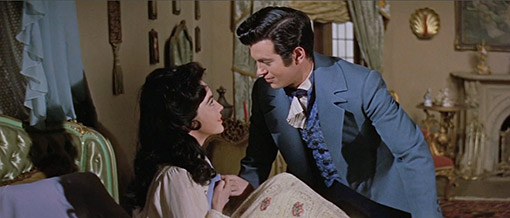
Damon also has the look of a Thunderbird pilot if you were trying to duplicate the larger features of the Anderson puppets for a live action remake. His worldview does not allow him the absurdity of casting his lot in with his prospective brother-in-law. Roderick Usher, Madeline's brother, is Price at his most arch. His eye-acting, seeing his supposedly dead sister move in her casket, and hoping her fiancé hasn't clocked said movement, is almost too camp for the emotional tone the movie is going for. But you buy it if only for the fact that as an audience, you've already seen her breathing – but there's a good reason for that. The scene cleverly trades on a small bit of business all audiences probably do while invited to look at a corpse on screen... We always notice when the supposedly 'dead' are still breathing... It's one of the few times our willing suspension of disbelief is unwillingly unsuspended.
The story requires Price's Roderick to suffer from super sensitivity so he cannot bear loud noises. This sensitivity is conveniently forgotten at certain points in the story but again, this is par for the course and doesn't detract. Neither does this curious disability have any kind of pay off save the comic touches of having Philip remove his boots so the clacking of heels on wooden floorboards won't hurt Roderick's eardrums. Roderick's staunch belief that the family house (in which all Usher descendants are interred – creepy) is a damned one, full of evil, as is his entire family line, leads him to make decisions that are actually (in his own mega-skewed world) entirely logical. If you believed your sister was madder than mad Jacqueline McMad (winner of last year's Ms. Madwoman Competition), you'd think you were doing her fiancé a favour by warning him away from her. Of course, Philip doesn't believe such nonsense and treats the three attempts on his life by the house itself as his bad luck at just being in the wrong place at the wrong time. Well, you never know when chandeliers are going to fall, bannisters break and coffins slide off their resting places, do you? There is such a heavy pall on the house and its two morbid occupants, you want to tempt Philip away with urgent business so the Ushers can hasten to their inevitable fate – but is it inevitable and can Philip intervene and breathe life back into this dark mansion whose last spring clean was a century ago with something considerably less powerful than a Dyson?
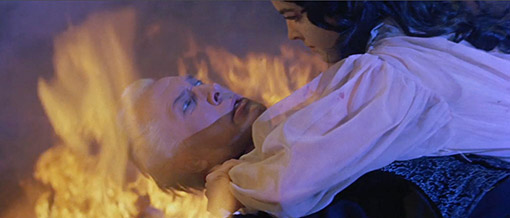
Madeline cannot seem to commit to any course of action. She seems relieved to be offered a way out of her ghastly brother's imprisonment but then is strangely unmoved by her fiancé's efforts to break her out of her brother's morbid orbit. Myrna Fahey looks the part and has that other-worldly detachment, a good fit with Price. She's also convincingly, theatrically off her nut. It doesn't help that she's a few crows short of a murder and she has this secret that allows her brother (for reasons that not only escape me but set up a small hardware store in Siberia) to bury her alive. Price excels as the super-sensitive Roderick who really is trying his best to serve everyone's needs. The fact that his actions have such alarming consequences are more to do with genre expectation than poor old Roderick's intentions. You just know that a happy end is not in the Usher family's future and all through the movie you are praying that it happens swiftly without suffering. Sorry, not an Usher house's chance in a tarn.
It's at this point that I must mention one of Corman's creative collaborators someone whom I should have brought up in my review of The Raven, composer Les Baxter. His work here on Usher is sterling and completely in keeping with the dramatic needs of the piece but his playful musical quotations and smile-inducing cherry picking for The Raven were one of the film's principal pleasures and I regret not mentioning that in the actual review. So I'm mentioning it now. So often the urgency and emotional core of a movie is provided by the composer that it seems a crime not to have mentioned their contribution in every review. Much like the writer and editor, both sidelined by the star wattage of the actors and directors, the composers need champions and from here on in, I'm making myself more sensitive to their unique and powerful contributions.
The Fall of the House of Usher is a terrific example of Roger Corman's ever widening circle of gothic, directorial accomplishment. That it stays faithful to the darker tones of its source material is commendable. After The Raven, gothic may have invited scorn as much as hilarity but the tone of this piece is mercifully straight and as suc]\;h walks a wonderfully morbid line. And how have I made it this far without a pun on the word 'usher'. No idea.
The first of Corman's Poe films was also the first to be released by Arrow as a stand-alone Blu-ray (in a rather spiffy SteelBook edition – there are still copies out there if you want to pick one up) and in that sense it set the standard for the the titles that followed. Despite the odd shot where the focus is a little soft on parts of the picture that you'd expect to be sharp (whether this is a print issue or a glitch with the anamorphic lens that was impossible to correct I'm not in a position to say), the image is generally crisp and detailed and superior in every respect to MGM's previous DVD release. The colour initially feels a little less vibrant that it is on the transfers of the later films in the series, although the earthy hue to the house interiors would seem to be deliberate judging by the cooler look of the exterior shots, and the vivid blues and reds of the dream sequence are gorgeously rendered. As with the other films in the set, the contrast is very nicely pitched, delivering solid black levels without swallowing shadow detail. The film grain is fine and there's hardly a trace of any damage or dust. Most impressive.
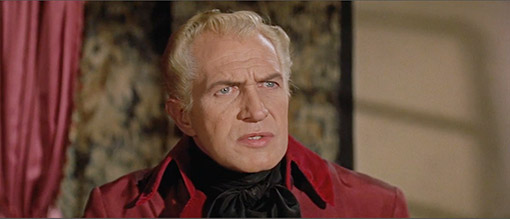
The Linear PCM 2.0 mono soundtrack is in very good shape, with the music in particular displaying a decent dynamic range and the dialogue always clearly rendered. There's no trace of damage and no distracting background hiss or crackle.
Unlike the newer discs in this set, there is no isolated music and effects track, but optional English subtitles for the deaf and hearing impaired are available.
Audio Commentary by Roger Corman
The soothing and velvety voice of Roger Corman guides us through the making of the first of his Edgar Allan Poe adaptations and it's an enthralling track, albeit one that anyone who owns the earlier MGM DVD of the film will be familiar with. Corman divides his time between scene-specific information and more generalised comments on the production and his collaborators, and it's all worth hearing. Topics covered include: the process of creating visual and aural jolts for the audience and the thinking behind them; the commissioned paintings (created by artist Burt Shonberg) that adorn the house walls; the method of undercranking the camera to create more visually startling pan and dolly shots; the dream sequences (a chance to really experiment) that became a signature element of the series; the process of staging the climactic fire (everyone apparently looked forward to that); the shot composition and art direction; the film's critical and commercial success; the Freudian elements, and so much more. I was amused by Corman's suggestion that the film's low budget and fast shooting schedule were the reason that front door of the Usher house opens without a loud atmospheric creak (that must be one seriously expensive sound effect), and the idea that he employed someone to distract the fire marshal who was overseeing the fiery climax so that he could push the flames just a little bit higher is made all the more amusing by this anecdote's confessional nature. And all this is just a sampling. An essential companion to the main feature.
Legend to Legend (26:47)
Corman Film School graduate Joe Dante, who was a big fan of the filmmaker's work when he was at college, recalls how he wrote to and nearly met Corman and was later employed by him to edit film trailers (I'm presuming for New World), which Dante suggests is excellent training for would-be directors. Dante is one of that hallowed group of filmmakers who always gives good interview and whose enthusiasm for their subject quickly proves infectious. And he covers a lot of ground here, eventually moving on from his own memories of working for Corman to an engaging discourse on the director's Poe cycle, which does include a few factual snippets that also get aired on a number of the other extra features here. Perhaps my favourite story concerns Corman's practice, in his role as a distributor, of recalling films if they didn't do well in their first week of release and recutting and re-issuing them under a different title. Some unlucky drive-in and grindhouse theatres, Dante recalls with a smile, would end up booking the same film twice without realising, which didn't go down too well with the paying audience.
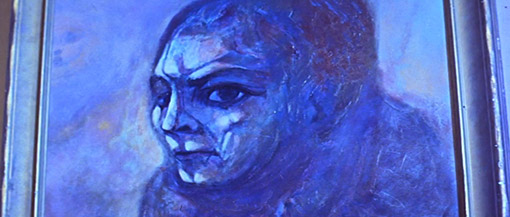
The House is the Monster (32:58)
Jonathan Rigby, author of English Gothic and American Gothic, delivers a knowledgeable and detailed analysis of the film, its making, and its qualities as a style-setting work of horror cinema. He did make me glad that Camus had chosen to review the film, as half of my own notes were rendered second-hand here, as Rigby ticks off many of the very points I'd have been looking to make myself and even shares my viewpoint on a number of elements. If you're watching the extras in the order they are listed then you'll have heard a few of the stories before by the time you catch them here, but there's still plenty of new material and some personal opinion on the quality of performances and makeup for you to share or take issue with. Rigby also usefully dissects the more bemusing aspects of the film's theatrical trailer, which is also usefully included on the disc.
Archival interview with Vincent Price (11:26)
The wonderfully genial Price pays host to director and producer Claude Ventura for an interview conducted in 1986 for his French TV series Cinéma cinemas, which is why the conversation – which is conducted in English – is hard-subbed in French. This is lightweight stuff but engaging nonetheless, particularly when Price talks about having just done the narration for the Disney short film Vincent, which was directed, of course, by a young Tim Burton, for whom Price would later give his final screen performance as The Inventor in Edward Sissorhands. I was also intrigued to hear him describe James Whale's 1940 romantic adventure Green Hell, in which he had a small supporting role, as one of the very worst films ever made.
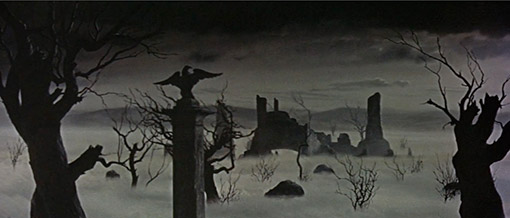
Fragments of the House of Usher (10:47)
This is – and I quote – "a specially-commissioned video essay by critic and filmmaker David Cairns examining Corman's film in relation to Poe's story," and I really don't know what to make of it. Actually, I'm not sure what I'm supposed to make of it, as it's genuinely hard to tell if Cairns is quietly disappearing up his own critical backside or attempting a would-be comical parody of the same (I kind of suspect the latter). Delivering his observations in the tone of a seriously sleep-deprived super-villain outlining his evil plan to a captured spy, Cairns employs a few of those terms that more highbrow critics have used for years to look mockingly down at the horror cinema of the period (Price's performance is 'camp', the film is 'goofy', and one unremarkable dialogue exchange is described as one of the most unintentionally hilarious in the history of cinema). He does, however, hit upon a really interesting idea when he suggests that Corman, Matheson and the three lead players are all telling slightly different versions of the story. It may well be worth getting someone else to explore that notion in more depth.
Trailer (2:30)
This is the very trailer picked up on by Jonathan Rigby, one that colourfully describes Vincent Price as "the screen's foremost delineator of the Draculean!" despite the fact the Price never actually played Dracula and even today is not known for playing a vampire – indeed, in The Last Man on Earth, the first film adaptation of Richard Matheson's I Am Legend, he was one of the only people in the film who is not a vampire.
Of all the films in the series, The Fall of the House of Usher is the most faithful to its source material, despite some creative alterations to shape the story for its contemporary target audience. In retrospect it's easy to see why it was such a hit and why American International, whose fortunes were effectively made with this film, were so keen for Corman to lay a few more similarly shaped golden eggs. The film is terrific, the transfer impressive and the extras (well, most of them) really are first class. Can this Blu-ray set do no serious wrong?
|